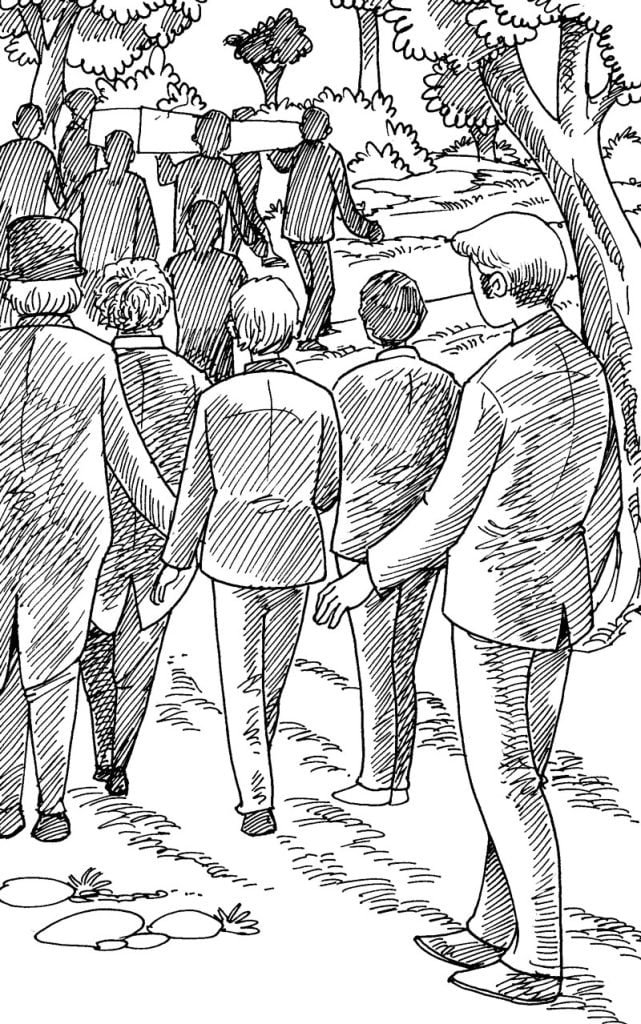Chapter-10
Jerry Cruncher, the messenger, was sitting outside Tellson’s Bank as usual, when a mob came marching down Fleet Street.
“It’s a funeral procession,” he told his son, who was sitting beside him.
Jerry was always attracted by funerals but this one was very unusual, for people were running alongside the carriage that held the coffin, shouting, “Spies! Spies!”
When someone whispered that the dead man was a Roger Cly, Jerry muttered to himself, “The man at Charles Darnay’s trial!”

Jerry followed the mob to the graveyard, watched the burial and then went home. That night, he told his wife and son that he was going fishing.
“But whenever you fish at night, your boots get so dirty and you get rust under your fingernails?” asked his son.
“No more questions! It’s time for bed!” snapped Jerry.
When his family was asleep (or so he believed), Jerry unlocked a cabinet and took out a sack, a crowbar, a rope and a chain.
His son slipped out of bed and followed his father at a safe distance. Two more ‘fishermen’ appeared, and the three men walked quickly along a lonely road. Then they climbed over an iron gate.
Peering through the gate, the boy saw the men ‘fishing’ among the graves in the churchyard. When they raised a coffin to the surface, the boy ran home terrified.
There was no fish for breakfast the following morning at the Cruncher house.
Madame Defarge sat in the wine shop, her fingers knitting but her eyes on the look-out for spies that were always being sent into the Saint Antoine section by the king.
“Good day, my dear wife!” called Ernest Defarge, returning from a three-day trip to the country, “On my journey, I met this good gentleman.” And he pointed to a man with a blue cap beside him. “He is a fixer of roads. Give my new friend some breakfast.”
When the two men had finished their morning meal and the shop was emptied of all customers except two, Defarge and the road fixer joined them at their table.
“Now that all of our good ‘Jacques’ are here, we may begin,” said Defarge, using the code name ‘Jacques’ that the revolutionaries used to identify one another. “I shall be Jacques One, and here.” And he pointed to the road fixer,” Here is Jacques Two. Speak, Jacques Two, and tell them everything.”
“It was a year ago this summer,” began the road fixer, taking off his blue cap, “when I first saw Gaspard. He was hanging by a chain under the Marquis’ carriage. But I had no idea that he was planning to kill him.”
“When did you see him again?” asked Jacques Three.
“Well, Gaspard ran away after he had killed the Marquis and managed to avoid the soldiers for months and months. But he was finally caught, and when I next saw him, he was hanging from a gallows forty feet high in the village square. I was so enraged at this that I left the village at sunset and walked all that night and half the next day until I met Jacques.” And he pointed at Defarge.
“You are a good man!” said Defarge, “and worthy of joining our cause. But please leave the shop for a moment, as we must talk.”
After the road fixer had gone out of the door, Jacques Three turned to the other men. “What do you say, Jacques?” he asked Defarge, “Do we put the village officials on our list?”
“To be listed as doomed for destruction!” replied Defarge.
“Are you sure that problems won’t arise as a result of our keeping this list of our enemies’ names?” asked Jacques Four, “I know it is safe, because no one besides us, or rather she, can understand it.”
“Don’t worry,” answered Defarge, “Even if my wife kept the list in her head, she would never forget it. But the list is knitted in a special pattern and design so that it will always be plain as day to her. There is no way that a single letter of an enemy’s name or a single crime can be erased from Madame Defarge’s knitted list!”
Madame Defarge was a hard-working lady she would stand all the day at the counter serving wine to a lot of customers. She was a very polite lady too. She would never talk to her customers in an abusive language. It was her daily routine to close the shop in the evening. After downing the shutter of the shop she would walk onto the streets of saint Antoine. All the women in the neighbourhood respected her.
Madame Defarge would talk to each and every women of the groups thus formed on the streets. All the women would knit with great intent, for they knew that in the absence of knitting they would have to sleep on empty stomachs. In fine, knitting was their sole bread and butter.
